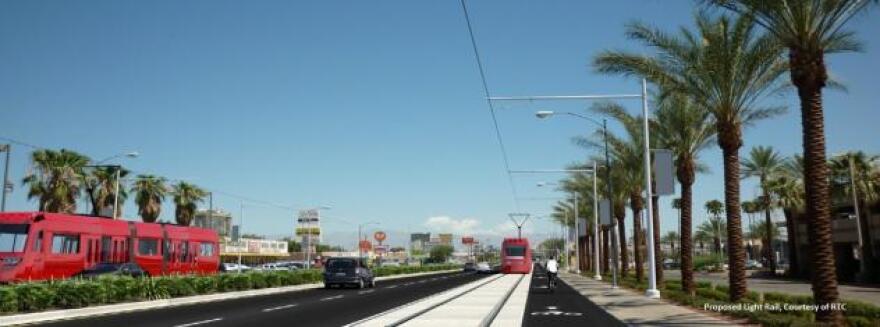The years of studies, presentations and lobbying for light rail on Maryland Parkway in Las Vegas hit a dead end last week.
The Regional Transportation Commission board unanimously voted to install a bus rapid transit line instead of pursuing light rail.
The $335 million bus rapid transit project would cost less than half of what light rail would, a factor board members cited in their decisions.
"As the board looked at the options we presented to them last week, I think one of the things that really concerned them were the fiscal constraints," said David Swallow, senior director of engineering and technology for the Regional Transportation Commission.
He said there are concerns about trends in revenue from transportation systems and the Trump administration prefers bus transportation over rail.
The RTC is working to get federal grant money to help pay for the transportation projects along Maryland Parkway, but it is a competitive grant.
Swallow said the rapid bus transit, or RBT, will differ from regular buses in several ways, including having a dedicated bus lane, larger passenger facilities at stops and fewer stops.
The Maryland Parkway RBT would be similar to systems put along Sahara Avenue and Boulder Highway, which Swallow said both saw a jump in ridership when rapid bus transit went in along those streets.
Still, supporters of light rail say they are exploring their options, including trying to take the matter to voters.
One of the most vocal supporters of light rail over buses is Robert Lang of Brookings Mountain West at UNLV.
Lang told KNPR's State of Nevada that he understands why the board made the decision.
"This was just a straight up and down vote along just a transportation-only, people-moving-focused discussion," he said.
He believes the board should have looked at that issue more broadly and taken into consideration the development that comes along with light rail systems.
He pointed to places like Salt Lake City and Phoenix where light rail has been put in and development at the stops has blossomed.
Lang said part of the problem is Maryland Parkway is physically going to run out of space and the belief that driverless cars or more rideshares are going to help doesn't match with reality.
He pointed out that whether someone is driving a private vehicle or a computer is driving a private vehicle, 60 people in 60 cars will take up more space than 60 people on a train.
The RTC says a majority of people wanted light rail instead of rapid bus transit, including the business owners along Maryland Parkway.
Ric Jimenez represents some of those business owners. He is the head of the Maryland Parkway Coalition.
"Definitely disappointed, to say the least," Jimenez said.
He wished the RTC board would have looked at the project as something beyond just transporting people around.
"Looking at it just from a transportation standpoint is not the right way to look at this," he said, "We have to look at it not only from just economic but also art and culture."
Jimenez said he would support any petition drive to revive the project either through the Legislature or through the RTC.
Lang believes the voters should decide and he believes if it were put to the voters they would support it - even though the estimated cost of the project would be between $700 million and $1 billion.
The RTC said the bus rapid transit project could be under construction by 2022 and running by late 2024.
Next steps include seeking federal approval — and funding.
David Swallow, senior director of engineering and technology, Regional Transportation Commission; Robert Lang, Brookings Mountain West at UNLV; Ric Jimenez, Maryland Parkway Coalition









